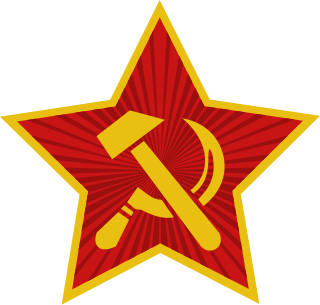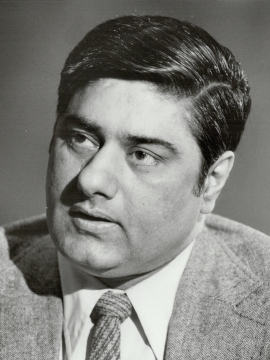
The Communist Party of Germany was a major political party in the Weimar Republic between 1918 and 1933, an underground resistance movement in Nazi Germany, and a minor party in West Germany in the postwar period until it was banned by the Federal Constitutional Court in 1956.

The Communist Party of India (Marxist–Leninist) (CPI (ML)) was an Indian communist party formed by the All India Coordination Committee of Communist Revolutionaries (AICCCR) at a congress in Calcutta in 1969. The foundation of the party was declared by Kanu Sanyal at a mass meeting in Calcutta on 22 April, Vladimir Lenin's birthday. Later the CPI(ML) party splintered into several Naxalite groups.
The Marxist–Leninist Party, USA (MLP) was the final incarnation of a series of communist anti-revisionist groups that began in 1967 lasted until 1993 when it dissolved. It published the paper Workers Advocate. During its history, it became a Hoxhaist group, before turning away from backing Albania and attempting to advance a distinctive anti-revisionist trend in Marxism–Leninism. It was founded as the American Communist Workers Movement (Marxist–Leninist) in the 1960s as a Maoist organization allied with the Canadian Communist Party of Canada (Marxist–Leninist), CPC (M-L).
Communist League of Luxemburg, was an anti-revisionist Marxist-Leninist political organization in Luxembourg. Forerunner of the KBL was the Association Générale des Etudiants Luxembourgeois (ASSOSS). ASSOSS was originally a left liberal organization founded in 1912 which moved leftward in the sixties. In 1969 it was transformed in the radical Gauche Socialiste et Révolutionnaire (GSR). After the split of the trotskyist Ligue Communiste Révolutionnaire (LCR) in 1970 the majority of GSR was renamed in KBL in 1972. In 1972 Kommunistische Gruppe Luxemburg (KGL) split from KBL. In 1975 Kommunistische Organisation Luxemburgs/Marxisten-Leninisten (KOL/ML) broke away but returned in 1978.
The New Communist movement (NCM) was a diverse left-wing political movement principally within the United States, during the 1970s and 1980s. The NCM were a movement of the New Left that represented a diverse grouping of Marxist–Leninists and Maoists inspired by Cuban, Chinese, and Vietnamese revolutions. This movement emphasized opposition to racism and sexism, solidarity with oppressed peoples of the third-world, and the establishment of socialism by popular revolution. The movement, according to historian and NCM activist Max Elbaum, had an estimated 10,000 cadre members at its peak influence.
The term ultra-leftism, when used among Marxist groups, is a pejorative for certain types of positions on the far-left that are extreme or uncompromising. Another definition historically refers to a particular current of Marxist communism, where the Comintern rejected social democratic parties and all other progressive groupings outside of the Communist Party.
The Communist Workers Organisation was a communist group in the Netherlands. It was founded as the Marxist-Leninist Rotterdam Group (Groep Rotterdam marxistisch-leninistisch in March 1972 by a group of dissidents from the Communist Unity Movement of the Netherlands, following the departure of the 'Proletarian' wing of the KEN in October 1971.

The Communist Party of Germany is an anti-revisionist Marxist-Leninist communist party in Germany. It is one of several parties which claim the KPD name and/or legacy. It was founded in Berlin in 1990.
Communist Party of Germany is a name that has been and is being used by several Communist organizations in Germany.

The Communist Party of Germany/Marxists–Leninists was a clandestine communist party active in West Germany and East Germany during the Cold War. It was founded in 1968 by former Communist Party of Germany (KPD) official Ernst Aust, who subsequently became the party's chairman. An anti-revisionist party, the KPD/ML upheld the legacy of Soviet premier Joseph Stalin and supported China under Mao Zedong and later Albania under Enver Hoxha after the Sino-Albanian split. At its peak in the mid-1970s, the party claimed a membership of around 800.
Communist Party of Switzerland/Marxist–Leninists was a Maoist political party in Switzerland. It was founded in 1969 by now exiled intellectual Nils Andersson. Its forerunner, the Lenin Centre, had been founded in Lausanne in 1964.

The Communist League of West Germany was a Maoist organization in West Germany which existed from 1973 until 1985. The KBW contested the general elections in 1976 and 1980 in West Germany and was rated as the strongest of the German Maoist parties from 1974 until 1981. After 1982 the KBW was virtually inactive and was finally dissolved completely in 1985.
The Communist Party (Marxist–Leninist) was a Maoist political party in the United States.

Hardial Bains was an Indo-Canadian microbiology lecturer, but was primarily known as the founder of a series of left-wing movements and parties foremost of which was the Communist Party of Canada (Marxist–Leninist). Presenting himself as staunchly anti-revisionist and pro-Stalinist, until his death, Bains acted as the spokesperson and ideological leader of the CPC (ML) — known in elections as the Marxist–Leninist Party of Canada. During his lifetime, Bains' outlook swung from supporting the Soviet Union under Joseph Stalin, to Mao Zedong's China, then later to Enver Hoxha's Albania. Shortly before he died, and abandoning his previous sharp criticisms of the country, Bains turned to Fidel Castro's Cuba for inspiration. Spending most of his life in Canada, Bains was also politically active in England, Ireland, United States and India.

The Free Socialist Party/Marxist-Leninists was a small Maoist political party in West Germany. FSP/ML was the second Maoist group founded in West Germany. It was one of the predecessor organizations of the Communist Party of Germany/Marxists–Leninists.
Anti-revisionism is a position within Marxism–Leninism which emerged in the 1950s in opposition to the reforms of Soviet leader Nikita Khrushchev. Where Khrushchev pursued an interpretation that differed from his predecessor Joseph Stalin, the anti-revisionists within the international communist movement remained dedicated to Stalin's ideological legacy and criticized the Soviet Union under Khrushchev and his successors as state capitalist and social imperialist.
The International Conference of Marxist–Leninist Parties and Organizations (ICMLPO) was an international grouping of political parties and organizations adhering to Mao Zedong Thought founded in 1998 by the Marxist-Leninist Party of Germany. It was organized by a Joint Coordination Group and met every two or three years. It ceased to exist in 2017.
The Communist League was a radical left-wing organisation active in West Germany from 1971 until 1991. The KB emerged from the protests of 1968 and initially had a Maoist orientation. Later in the 1980s it became a leading organisation of the "undogmatic left" (undogmatische Linke). It was one of several rivaling minor communist groups in West Germany collectively called "K groups.”
The Kommunistische Partei Deutschlands (Aufbauorganisation) (KPD (AO), Communist Party of Germany (Pre-Party Formation)) was a West German Maoist group founded in 1970. It changed its name to the Kommunistische Partei Deutschlands (KPD) a year later.






